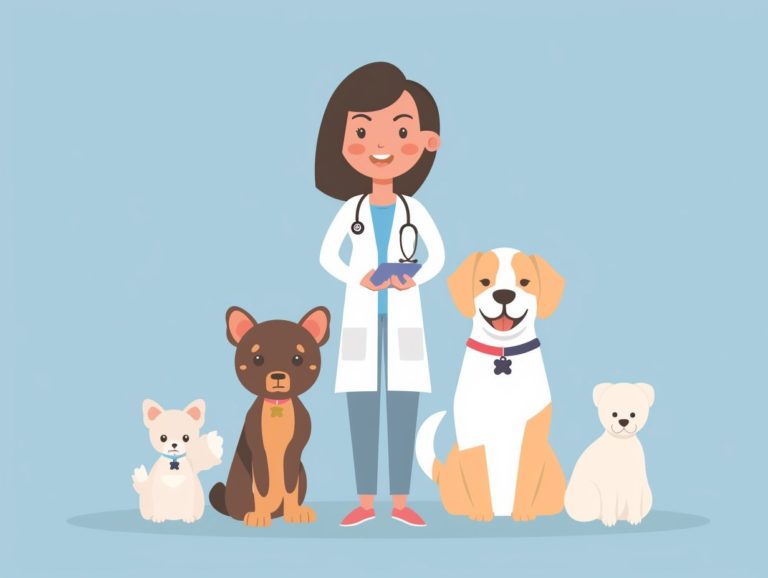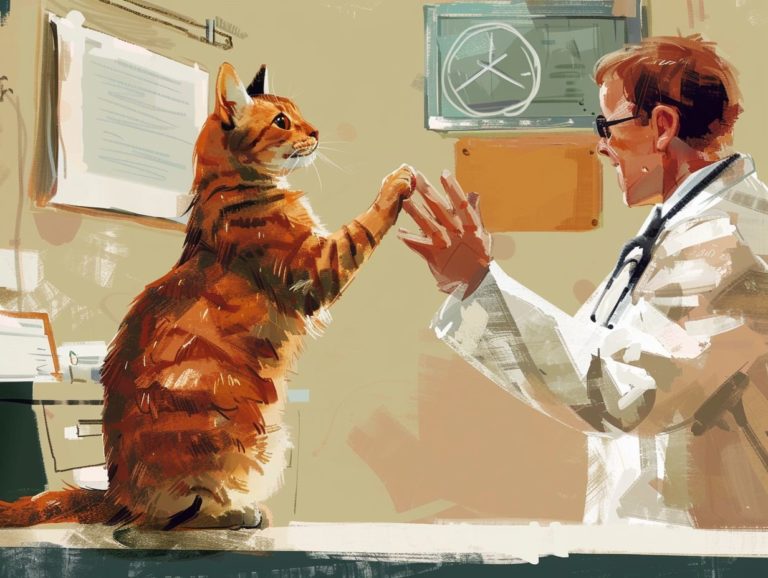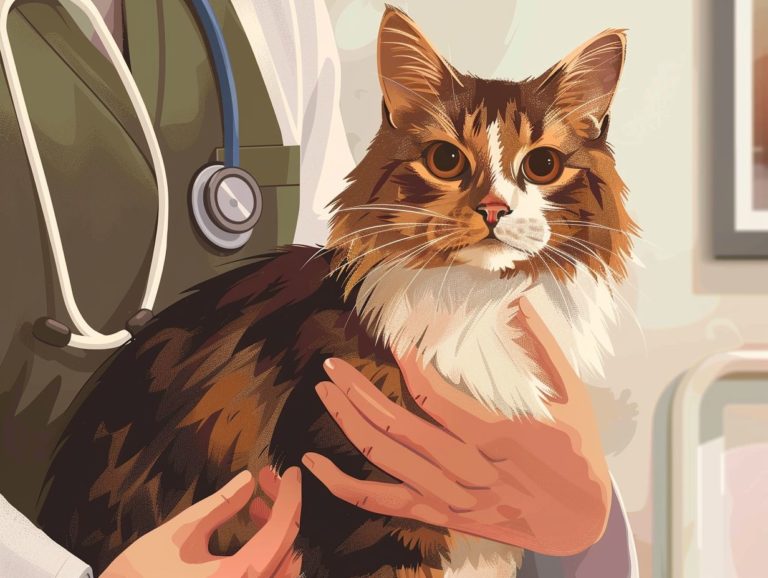How To Use Your Cats Health Plan Effectively
Caring for cats involves more than just providing food and shelter. Understanding and implementing how to budget for a cat health plan is crucial for ensuring the well-being of a pet.
A cat health plan functions as an agreement that outlines the terms and conditions of the health care and medical services available to a cat owner for their cat, covering prevention, diagnosis, treatment, and overall care. From routine check-ups to financial assistance for illnesses and emergencies, a cat health plan offers both peace of mind and financial security.
However, how does one go about selecting the right plan for their cat? What factors should be taken into account when planning for a cat’s health? This article will explore the benefits of a cat health plan, strategies to make the most of such a plan, and common misconceptions regarding pet insurance.
Key Takeaways:
Understanding Your Cat’s Health Plan
Ensuring the health and longevity of your cat involves understanding your cat’s health plan, which encompasses a comprehensive approach to preventive care, veterinary visits, and specific health strategies. Regular veterinary check-ups are essential components of a cat’s health plan to detect and address potential problems early. Preventive healthcare guidelines include vaccination, parasite control, dental care, and proper nutrition, all of which are crucial for maintaining cats’ overall health and reducing the incidence of disease.
Cats have varying health requirements as they age, often necessitating changes in diet, exercise, and medical care. By being proactive and well-informed about your cat’s health at every life stage, you can ensure the best quality of life for your feline companion.
What is a Cat Health Plan?
The Cat Health Plan is a comprehensive schedule designed to ensure that a cat maintains good health and addresses any health issues proactively. It encompasses regular veterinary evaluations, preventative care interventions, and personalized nutritional and lifestyle advice.
Regular veterinary evaluations are a fundamental aspect of the Cat Health Plan, offering opportunities for early disease detection. During these check-ups, veterinarians conduct thorough physical assessments, administer necessary vaccinations, and provide recommended preventative treatments such as flea and tick control.
Early interventions, such as proper parasite control and ensuring cats are up-to-date on their vaccinations, have demonstrated efficacy in disease prevention. Additionally, early intervention through pet insurance can lead to better outcomes and reduced overall healthcare costs.
Benefits of Having a Health Plan for Your Cat
Health plans for cats offer the advantages of early disease detection, improved quality of life, and cost-effective preventive care. These plans ensure long-term health and well-being by adhering to preventive healthcare protocols. Regular check-ups and vaccinations, which are integral parts of a structured health plan, can proactively address any health concerns before they escalate, resulting in less invasive treatments and better outcomes.
Tailored preventive care can specifically target age-related issues such as arthritis, dental problems, and weight gain as a cat ages. A comprehensive health plan can simplify healthcare decisions, facilitate scheduling regular screenings, and enable owners to more easily fulfill the healthcare needs of their feline companions at all stages of their lives.
Choosing the Right Health Plan for Your Cat
When selecting a health plan for your cat, factors such as your cat’s age, lifestyle, and pre-existing health conditions should be taken into consideration to ensure the plan is tailored to meet your cat’s specific needs and promote better health outcomes.
The age of your cat plays a crucial role in determining the appropriate care and screening requirements, with younger cats often needing different preventive care compared to senior cats. Lifestyle considerations, such as whether your cat is indoor or outdoor, can also influence the type of coverage that would best suit your cat.
Adhering to preventive feline healthcare guidelines can aid in the early detection of underlying conditions, contributing to your pet’s overall health and fostering a proactive approach to your cat’s well-being.
Factors to Consider
When selecting a health plan for your cat, factors to consider include their age, life stage, and specific health needs. Key considerations for the health plan include kitten-specific diets, adult cat wellness exams, and senior cat preventive care.
For kittens, essential components of the plan include vaccinations, parasite prevention, and a diet that supports their rapid growth and development. Adult cats require regular dental care, maintaining a healthy weight, and screening for common adult cat illnesses like kidney disease. Senior cats benefit from joint supplements, blood pressure monitoring, and more frequent vet visits to address age-related health concerns such as arthritis or a decline in organ function.
Types of Health Plans Available
There are different types of health plans for cats, such as plans for indoor cats, vaccination schedules, and dental care packages. Each of these plans is designed to address specific health needs and offer comprehensive healthcare coverage for cats.
Making the Most of Your Cat’s Health Plan
To maximize the benefits for a cat’s health plan, it is crucial to focus on regular check-ups, grooming, flea prevention, and other preventative care measures that emphasize early detection and maintenance of good health.
Regular check-ups with a veterinarian are essential for detecting medical issues early and ensuring prompt treatment. Grooming plays a vital role in a cat’s overall hygiene and physical well-being. Flea prevention, achieved through medications or topical treatments prescribed by a veterinarian, is key to preventing discomfort and potential diseases.
Regular Check-ups and Preventive Care
Regular check-ups and preventive care are essential components of a cat’s health plan, encompassing routine handling practices, appropriate housing environments, and proper identification methods. These measures play a crucial role in preserving a cat’s health and allowing for early intervention when needed.
Scheduling regular check-ups with a veterinarian ensures the overall well-being of your cat and enables timely identification and resolution of any potential issues. Employing safe handling techniques is imperative to prevent injuries to both the cat and the human involved.
Providing optimal housing conditions, such as a clean, comfortable, and stimulating environment, is vital for maintaining a cat’s health. Utilizing proper identification methods, whether through microchipping or collars with ID tags, is essential in the event that a cat becomes lost and needs to be reunited with its owner.
Utilizing Coverage for Illnesses and Emergencies
Having coverage for cats’ health plans proves to be particularly beneficial during times of illness or emergencies. Being knowledgeable about addressing litter box issues, handling scratching behaviors, and recognizing common health problems enables individuals to make the most of their coverage when issues arise.
Litter box problems can be addressed by ensuring a clean living environment for the cat and ensuring that the area is not obstructed, as changes in behavior may indicate underlying health issues. Managing scratching behaviors involves providing cats with appropriate scratching posts and toys to redirect their natural urge to scratch.
Early detection and treatment of common health issues like dental problems and weight management can be accomplished through regular vet check-ups, helping to prevent further complications. Taking a proactive approach to managing a cat’s health enhances the effectiveness of the pet’s health plan coverage.
Common Misconceptions About Cat Health Plans
Correcting misconceptions about cat health plans is essential for making informed decisions. Misunderstandings regarding the necessity, use, and value of blood tests, vaccinations, and pet insurance can create confusion about the importance and benefits of cat health plans that incorporate these vital components.
Some of the most common misconceptions about these elements are as follows:
- Blood tests are deemed costly and unnecessary. However, blood tests play a crucial role in the early detection of underlying health issues in cats long before they exhibit symptoms.
- Vaccinations are sometimes considered unnecessary, but they are crucial for preventing a range of illnesses and maintaining optimal feline health.
- Pet insurance is often seen as unnecessary, yet it provides financial security in the event of an unexpected medical emergency, making it a valuable aspect of a comprehensive cat health plan.
Dispelling Myths and Addressing Concerns
Dispelling myths and addressing concerns about cat health plans often involve providing information that is endorsed by the American Animal Hospital Association and similar reputable organizations. Topics such as grooming practices, the benefits of microchipping, and appropriate preventive care guidelines can offer clarity and education for pet owners regarding their pet’s health.
A portion of pet insurance covers grooming costs, not only because a well-groomed cat is more enjoyable for owners to live with, but also because proper grooming is a crucial aspect of overall pet health. Regular brushing of long-haired cats helps minimize matting and reduce shedding, while nail trimming aids in preventing painful overgrowth.
Microchipping serves as more than just pet identification; it is a permanent form of identification that can be scanned by nearly any veterinarian, shelter, or animal control officer. If there is a lost or stolen cat, a microchip can swiftly reunite the pet with its owner.
Following preventive care guidelines for cats, as established by the AAHA, is essential. These guidelines recommend comprehensive physical exams one to two times a year for all cats, irrespective of whether they exhibit signs of illness or disease. These exams should involve discussions between the pet owner and veterinarian regarding the pet’s daily routine, medical history, and any necessary diagnostic testing.
Frequently Asked Questions
What is a cat’s health plan and how can I use it effectively?
A cat’s health plan is a comprehensive guide that outlines your cat’s medical history, preventive care, and recommended treatments. To use it effectively, familiarize yourself with its contents and follow the recommendations provided.
What preventive care measures should I take for my cat?
Preventive care measures for cats include regular vaccinations, flea and tick prevention, dental cleanings, and annual check-ups. These measures can help keep your cat healthy and prevent costly medical issues in the future.
Do I need to update my cat’s health plan regularly?
Yes, it is important to update your cat’s health plan regularly to reflect any changes in their health or lifestyle. This will ensure that the plan remains relevant and effective in maintaining your cat’s well-being.
What should I do if my cat needs medical treatment?
If your cat needs medical treatment, refer to your health plan to see if it is covered by your insurance. If it is not covered, discuss payment options with your veterinarian and consider setting aside funds specifically for your cat’s medical needs.
Can I customize my cat’s health plan?
Yes, you can customize your cat’s health plan to fit their specific needs. For example, if your cat has a pre-existing condition, you can work with your veterinarian to create a treatment plan that is tailored to their condition.
How can I keep track of my cat’s health plan?
You can keep track of your cat’s health plan by downloading a mobile app or using an online portal provided by your insurance company. You can also keep a physical copy in a designated folder or binder for easy access.




